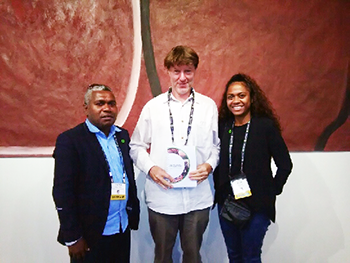ABM Archive Website
THIS WEBSITE CONTAINS ARCHIVE MATERIALS FOR HISTORICAL REFERENCE ONLY
For up-to-date information, including our latest appeals, news, and resources, please visit our current website.
ABM and Brisbane Diocese bring Pacific representatives to Climate Conference in Brisbane
June 11, 2019

Former US Vice President Al Gore was reaching the end of his climate presentation. At 71 years old, he still had plenty of fuel left in his tank.
‘We are living at the most critical time in human history because the decisions we make today will affect the future of our planet. What kind of legacy will we leave for our grandchildren?’, he thundered.
In the huge hall listening to Al Gore were nearly 800 climate activists. Most were from Australia, however ABM, with help from Brisbane Diocese, had brought two Pacific representatives: Casper Supa from the Anglican Church of Melanesia – Solomons and Ruth Narawa from the Anglican Church of Fiji. The two Pacific representatives hoped to learn more about climate change, widen their networks, and inject a Pacific voice into the discussion. Dr Terry Russell, ABM’s Humanitarian Coordinator, also attended the conference.
 |
| Dr Terry Russell, centre, with Casper Supa and Ruth Narawa |
Al Gore presented his famous slideshow on climate impacts. It included a graph, similar to the following, which seemed to disprove the climate sceptics’ assertions that our earth is just going through a natural cycle:
 |
|
Courtesy: https://climate.nasa.gov/climate_resources/24/graphic-the-relentless-rise-of-carbon-dioxide/ |
There were small group discussions where Casper and Ruth were able to share some of their experiences.
On the 3rd day of the conference, Brisbane Diocese organised for ABM’s two Pacific representatives to speak at a side event on a theological response to climate change.
Ruth and Casper noted that the Anglican Church in Fiji and the Solomon Islands were concerned about climate change and felt a strong obligation to address this as part of the Church’s mission. Churches across the Pacific, they explained, were very well placed to address climate change locally, as they have a strong structure from national down to grassroots level.
By the end of the three day conference, ABM’s two Pacific friends had made their voices heard. All attendees had learnt much about the science behind climate impacts and the likelihood that the increasing impacts will trigger increased inequality, conflict and migration. More hopefully, participants learnt how business interests and state level governments are leading the move to an economy dominated by renewable energy. The question remains: can we move quickly enough?


